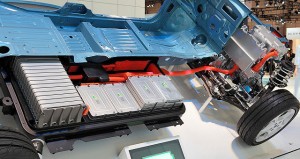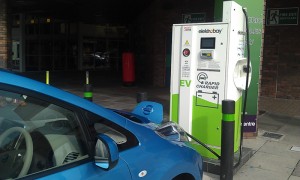The batteries in modern electric vehicles are not like the ones in laptops. It is true that they use similar chemistry (Lithium Ion) but the batteries in cars do not perform in the same way.
In a laptop it is not uncommon to need to replace the battery in a few years but there are several reasons why this is not the case with electric vehicles.
Multiple Modules

© H.Kashioka / CC BY-SA 3.0
Generally speaking, an EV battery is not one big cell. Much like the battery in a radio or large torch, it is made up of lots of smaller batteries, or cells, connected together. This means that if there is ever a problem with one of the cells it can be removed and replaced individually.
This feature means that in most cases the battery is never likely to ever need replacing in it’s entirety. Only those cells or groups of cells that actually have a problem will ever need replacing.
Battery Management Systems
Charging an EV battery is not like charging a rechargeable battery for your torch. With there being multiple cells there is a system within the car that manages the charging process ensuring that cells are not over-charged and making sure that the charge is even throughout the battery.
Thermal Management
![Thermometer© By Walta (Own work) [CC-BY-SA-3.0], via Wikimedia Commons](https://electricbluetesla.org/wp-content/uploads/Thermometer_R.jpg)
© By Walta (Own work) [CC-BY-SA-3.0], via Wikimedia Commons
Batteries get hot when they are being charged. There is a lot of electrical energy going in and the chemical reactions generate a lot of heat. One of the main causes of early battery reduction in performance is heat. If batteries get hot they start to break down and eventually their performance drops off. Modern cars have complex temperature management systems often involving dedicated water cooling and radiator systems. While a 100% battery EV won’t need a radiator to cool the petrol/diesel engine as in a non-EV you might still see radiators and cooling systems. These are often for battery thermal management.
These battery temperature control systems do a great job at keeping battery internal temperatures down and so extending battery life.
Gradual Performance Drop-off
As EV batteries get charged and used so their performance drops off slowly over time. However, this is such a slow process it isn’t really noticeable. However, at some point you will notice that the range is not quite as good as it was when new. This slow process continues throughout the life of the battery but is never sudden. There might come a time when the range of the battery no longer meets your needs and at that time you might consider a battery refurbishment but because the battery is made up of multiple cells only those cells that have the reduced performance need to be replaced to bring the battery back up to full performance.
It is a complete myth that EV batteries needs regular replacement and given that on average most people drive no more than 30 miles a day (supermarket, kids school run, clubs in evening, visit friends etc) so it is very likely that an EV battery would never need refurbishment over the entire life of the car!
Rapid Charging

When the Nissan Leaf was launched in 2011 Nissan warned against frequent rapid charging. They made it clear that rapid charging was fine but that regular use would in all likelihood reduce battery range prematurely. Since then Nissan has done a considerable amount of further testing and they have the combined experience of all the Nissan Leaf drivers worldwide and they have found that rapid charging does not reduce the battery life as much as was first thought.
In fact, Nissan now say that regular use of rapid chargers should not significantly reduce battery life any more than the 80% at 5 years/70% at 10 years that they say is likely providing that they are used no more than 1 rapid charge per day annually. That is not no more than 1 rapid charger per day. That means no more than 365 rapid charges throughout the year. In fact, multiple rapid charges per day is normal if you want to do a long trip and this is fine providing that the battery temperatures are monitored and the limits not exceeded.
So, while it is true that rapid charging will reduce the life of the battery more than slower charging it is not true that it will wreck the battery or make any significant difference. There are even people with EVs in the UK that have no private off-street parking and so must rapid charge all the time. In one instance the owner has done over 30,000 miles all done with rapid charging and so far he has seen no noticeable range reduction.
Summary
EV batteries do not need replacing every 5 years or ever! It is true that their range will reduce slowly over time but that may still not matter to most owners as it is more than likely that the range would still satisfy most owners needs. However, should you wish to refurbish a old EV battery then only those cells that need replacing will ever be replaced. You should never need to replace the whole battery.
Author’s Note
I have had my Nissan Leaf now for 2.5 years, it has done 24,000 miles and I charge it whenever I wish and use rapid chargers regularly too. In fact, I have done over 2000 charges and over 200 rapid charges. My range is still at least 90% of the new range. Nissan say batteries should have 80% of new range still remaining at 5 years and 70% at 10 years. My experience so far supports this and I may well out-perform those figures… as I would expect most EV batteries to do.
